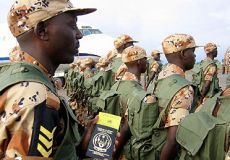Rwanda to send 2000 additional troops to Darfur
By John Bayingana, from Rwandan newspaper The New Times
KIGALI, Rwanda, June 29, 2005 — The Rwanda Defense Forces (RDF) is to increase its peacekeeping mission to Darfur to three battalions, comprised of two thousand troops by July 15, this year.

|
|
Rwandan soldiers belonging to the African Union wait to board a plane to be dispatched to the Darfur region of Sudan, April 2005. (Reuters). |
The revelation was made June 28 by Director of Research and Development in the RDF Lt. Col. Charles Karamba, while addressing students and staff of the Kigali Independent University (ULK) on the role of the RDF in managing the conflict in the troubled Sudanese western province of Darfur.
He noted that the professional discipline exhibited by the first contingents of the RDF had earned the force and the country in general an enviable place among the elite in peacekeeping missions on the continent and the world in general.
“Apart from the role of security and defence policy, the national armed forces provide an important and distinctive strand in the fabric and rebuilding of the nation and providing peace and security in the region,” Karamba noted, adding that the African Union had commended the credibility and commitment of the RDF.
He enumerated the various factors employed by the RDF to register the achievements as: the Professional Force Development, the AU initiative on conflict resolution and the entry of RDF in Peace Support Operations (PSOs).
“Our role in Darfur is to safeguard the UN peace observers that are dealing with resolving the use of small arms, the extremist groups like Janjaweed, the use of children in military services and, the weak state which will not or cannot safeguard minimal civil conditions,” Karamba said.
He said that the RDF had also joined the regional peacekeeping like the Africa Stand by Force (ASF) and the East Africa Standby Brigade (EASBRIG).
He however, lamented that the RDF had encountered several challenges, among them temperatures of more than 50º C, poor infrastructure, medical care and language barrier.
